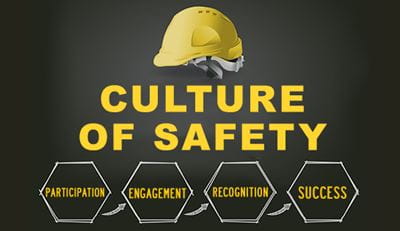Culture of Safety
- share

There are many things to consider when trying to achieve a culture of safety. Here are 3 key ingredients that will help drive and sustain a healthy safety culture in your workplace.
There are many things to consider when trying to achieve a culture of safety. Here are 3 key ingredients to help drive and sustain a healthy safety culture in your work place.
Participation

On the surface participation looks pretty straight forward, but this is much more than just participating in safety training sessions. Think of this as the frame work to a successful program. Participation should come from all levels within your organization supporting the cause. Everyone actively participating with one voice speaking a consistent message. Without the right people in the right places, the program will never thrive. Everyone has a role when it comes to safety and your participation is required for a successful, healthy safety culture.
Engagement

Keeping employees engaged should be at the forefront of your program. Keeping safety fresh in their mind will encourage safe behavior and drive best practices. This can be accomplished several different ways. Monthly eLearning, daily or weekly meetings, periodic training sessions, newsletters, etc. are all good ways to stay engaged. Challenge your team by setting goals or even a friendly competition to further the engagement. Communication is key, often and consistently.
Recognition

We all like to be recognized for a job well done and your safety program should be no different. Incentive programs for safe practices are great way to reward your people for a job well done. This can be done several different ways, from gift cards to cook outs or maybe even an extra vacation day. Some companies even have programs in place initiating proactive thinking by rewarding the employees for reporting potential safety issues before they actually arise keeping them ahead of the game. Always better to be proactive instead of reactive. Find the right recognition program that works for your team and it will pay big dividends for your safety program in the long run.


